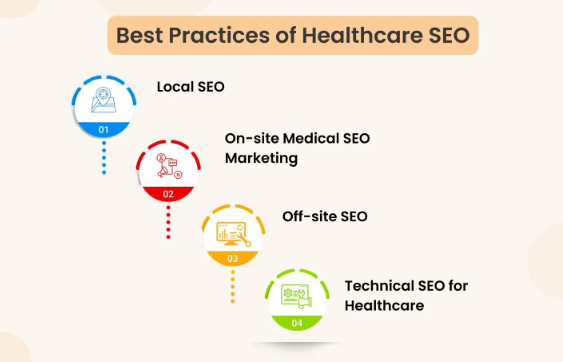Comprehensive Guide to SEO for Medical Centers


Ras Al Khor 3, Dubai
United Arab Emirates
+971 566 284 316
ask@faisalmiazi.com

In the digital age, a robust online presence is crucial for medical centers. Effective SEO strategies ensure that patients find your medical center quickly and easily, providing essential information and establishing trust. This guide delves into advanced SEO techniques tailored for medical centers, ensuring your website ranks at the top of search engine results.
Table of contents [Show]
SEO for medical centers requires a specialized approach. Patients often search for specific symptoms, treatments, and services. Ensuring your website appears in these searches involves targeting the right keywords, optimizing your content, and maintaining a user-friendly website.
The foundation of effective SEO is thorough keyword research. Focus on:
Utilize tools like Google Keyword Planner, Ahrefs, and SEMrush to identify high-traffic keywords related to medical services. Analyze competitor websites to uncover additional keyword opportunities.
Ensure each page has unique and descriptive meta titles and descriptions incorporating your primary keywords. This not only helps search engines understand your content but also improves click-through rates.
Use header tags (H1, H2, H3) to structure your content. Include keywords naturally within these headers to enhance readability and SEO.
Create detailed, informative content that answers patients' questions. Each page should focus on a specific topic or service, providing in-depth information. Use bullet points, images, and diagrams to enhance the user experience.
Link related pages within your website to help search engines understand the structure and hierarchy of your content. This also keeps users engaged, reducing bounce rates.
With the increasing number of mobile users, ensure your website is mobile-friendly. Use responsive design techniques to provide a seamless experience across all devices.
Optimize your website's loading speed by compressing images, leveraging browser caching, and minimizing JavaScript. Fast-loading pages improve user experience and search rankings.
Ensure your website uses HTTPS, providing a secure connection for users. Search engines favour secure websites, improving your overall ranking.
Claim and optimize your Google My Business listing. Ensure your name, address, and phone number (NAP) are consistent across all online platforms. Encourage satisfied patients to leave reviews, enhancing your credibility.
List your medical center on local directories and healthcare-specific websites. Consistent NAP information across these citations boosts your local SEO.
Create content tailored to your local audience. Blog about community health events, local medical news, and specific services relevant to your area.
Regularly update your blog with articles on health tips, medical news, and patient stories. High-quality, informative content establishes your authority and keeps your audience engaged.
Produce videos on medical procedures, doctor interviews, and patient testimonials. Video content is highly engaging and can significantly improve your search rankings.
Promote your content on social media platforms. Engage with your audience by answering questions and providing valuable health information.
Encourage satisfied patients to leave positive reviews on Google, Yelp, and healthcare review sites. Positive reviews build trust and improve local SEO.
Respond to all reviews, both positive and negative. Addressing concerns professionally shows your commitment to patient care and can mitigate the impact of negative reviews.
Regularly monitor your website’s performance using Google Analytics. Track key metrics like organic traffic, bounce rate, and conversion rates to identify areas for improvement.
Use tools like Google Search Console, Ahrefs, and Moz to track your keyword rankings and identify technical issues. Regular audits ensure your SEO strategies are effective and up-to-date.
Implementing these advanced SEO strategies will enhance your medical center’s online presence, attracting more patients and establishing your authority in the healthcare industry. Regularly update and refine your strategies to stay ahead in the competitive digital landscape.
